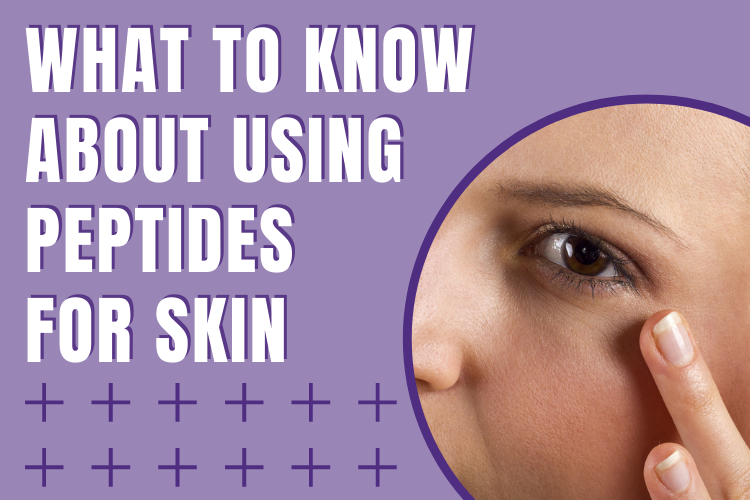
What to Know About Using Peptides for Skin
Using peptides for skin can have various benefits. Discover why you should add products with peptides to your skin care routine now.
Did you know peptides have been used in medicine for over a century? Since the synthesis of insulin in 1921, people have used peptides for a variety of different medical purposes.
Today, one of the most prominent is skin care. However, not everybody understands what they need to know before using it.
Let's take a closer look at the key information you should consider before using peptides for skin.
How Do Peptides Work?
Peptides are small molecules that act as messengers in the body. They send signals to specific cells, such as skin cells, and prompt them to carry out certain functions.
For example, they can stimulate collagen production or inhibit tyrosinase activity which controls pigment production. This helps to improve the structure of the skin and reduce discoloration. In addition, peptides can also help to reduce wrinkles and maintain a youthful complexion.
So, many people use them to combat the signs of aging.
What Are the Benefits of Using Peptides For Skin?
Using products with peptides has a number of advantages when it comes to skincare.
It can help to improve hydration levels, reduce the appearance of wrinkles and fine lines, promote collagen production, and even improve skin tone. Additionally, peptides can help to protect against sun damage, decrease skin inflammation, and reduce the appearance of redness. Having more elastic skin is also a benefit you should consider.
This makes them great for people who want to have clear, radiant skin. It's important to note that this could prove to be a benefit in many people's professional lives.
For example, people who interact with customers or clients (such as account managers) often need to create the best appearance possible for themselves.
Can Peptides Treat Skin Conditions?
Peptides are very effective in treating a range of skin conditions, such as acne, rosacea, psoriasis, and eczema.
They can reduce inflammation, provide hydration, and help to regenerate skin cells. As a result, these conditions may be more easily managed with products that contain peptides. This isn't a hard and fast rule, though. How effective these options are will depend on the individual.
To elaborate, some people are more responsive than others.
A dermatologist can help you determine whether or not peptides can manage certain conditions. It's always a good idea to get their opinion before spending time or money on these products.
In most cases, users will find that they substantially benefit.
Are There Any Drawbacks to Using Peptides For Skin?
Although peptides are generally safe for use in skin care products, some people may experience side effects such as irritation or allergic reactions.
It's always important to read the ingredients list and conduct a patch test before using any product with peptides in it. Additionally, you should speak to your doctor if you have any medical conditions or take medications that interact with peptides.
The last thing you want is for peptides to conflict with medication that you take on a regular basis. This could cause a number of complications in the future. For instance, peptides could impact the efficacy of a medication.
You might find that you then began to suffer symptoms that you normally wouldn't. As long as you use peptides responsibly, you shouldn't encounter any issues.
How Do I Find Quality Products?
When looking for products with peptides, it's important to check the ingredients list and research the brand. Additionally, make sure the product is designed specifically for your skin type and doesn't contain any harsh chemicals or fragrances.
Reading online reviews is one of the best ways to gain insight. When browsing through past feedback, consider factors like results, the time it takes to achieve them, etc.
You should also keep an eye out for reviews that don't seem genuine. To clarify, you might encounter feedback that sounds more like an advertisement than a legitimate review. As long as you keep this information in mind, you can be sure that you get the best quality product possible.
For How Long Should I Use Peptides?
The length of time you should use peptides will depend on your individual needs and expectations. In general, it's best to start slowly with a low-concentration product and gradually build up.
In some cases, this could mean using slightly less than the recommended dose. Over time, you can begin to use more and more.
Most people will start to see results within two to four weeks, depending on how consistent they are with treatments. However, they could take some people longer depending on how their body reacts. So, don't be discouraged if you don't see results right away.
How Do I Know if I Should Start Using Them?
If you have started to notice the signs of aging or other skin issues, such as wrinkles, fine lines, sagging skin, discoloration, or acne breakouts, then peptides may be a good option for you.
Additionally, if you are looking for an overall improvement in your complexion and skin tone then peptides can help with that too. As previously mentioned, it's best to speak to your doctor or a qualified skincare professional before starting any new skin care regimen.
Using Peptides Easier Than It Seems
At first, it might seem difficult to understand the benefits of using peptides for skin. The above guidelines, though, have all the information you need in order to take full advantage of them. Keep this in mind when moving forward.
Looking for more information about what we can do? Reach out to us today to see how we can help.



